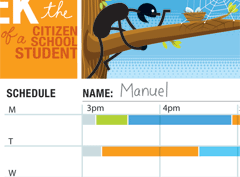A Week in the Life of a Citizen Schools Student
Citizen Schools uses the hours after school to teach kids important lessons.
Your content has been saved!
Go to My Saved Content.
On Monday afternoons, one hundred middle school students form a circle outside the McKinley Institute of Technology to begin their week with a Shout Out. "Teach!" yells one of the half-dozen adult team leaders. "Back!" the group replies in unison. "Teach!" the leader calls out again, and "Back!" comes the response, even louder.
Teach Back is a tenet of Citizen Schools, the after-class program founded a dozen years ago in Boston, and now operating in middle schools in seven states, including here at McKinley, a middle school in Northern California's Redwood City. Teach Back is shorthand for a student mastering a subject so thoroughly that he or she can impart it to others.
Keeping Kids in School
To create an after-school study program richer and deeper than most, Citizen Schools focuses on the golden hours that follow the school day, which is often over by 2:30 P.M. The Citizen Schools' model dedicates these fifteen additional weekly hours to activities and events designed to increase a student's involvement and awareness. The program targets middle schools, because, according to Citizen Schools interim California director Sylvia Kidder-Barry, "A lot of students drop out in ninth and tenth grade, and we can reach them best in middle school."
For the last several years, seventh grader Manuel and eighth grader Kris -- who both struggled at Redwood City's tougher schools -- have participated in McKinley's Citizen Schools after-school program. To their own -- and their parents' -- delight, they have found that classes can actually be fun when you master the basic skills. Both believe that the difference is the individualized, grade-boosting assistance of part-time team leaders who teach the first hour of each week day, and who are the key to Citizen Schools' academically focused Mondays and Tuesdays.
Team leaders and other Citizen School professionals, such as Kidder-Barry, work closely with teachers and administrators to take up where the regular curriculum leaves off; they teach organizational skills, math, writing, note taking, and reading. Citizen Schools kids learn the basics, the lack of which can abort a student career before it reaches takeoff speed. Twelve-year-old Manuel heard about the program from his sixth-grade literature teacher who suggested that Citizen Schools could help him improve his grades. And after two years in the program, thirteen-year-old Kris has found his writing improved: "Writing became easier when they taught us how to print neatly, spell words in our head, and think about what we wrote," he says.
Real-World WOW
It is on Wednesdays that Citizen Schools diverge from the typical regimen of after-school academic tutoring and counseling. On this day, students participate in apprenticeships that introduce them to the "real world" that exists beyond the often-limiting confines of home, neighborhood, and school. Lawyers, architects, bankers, and other professional leaders act as coaches, encouraging the students to explore life beyond school during a one-day-a-week apprenticeship that lasts twelve weeks. There is even a lesson about democracy built into the apprenticeship programs. At the beginning of each semester, potential mentors discuss their profession, after which students vote on which program to join.
Citizen Schools' apprenticeships are not simply big-city field trips. Rather, the program involves the students in some of the most compelling aspects of modern work life. In recent years, mind-expanding apprenticeship activities have included stock-portfolio analysis at Goldman Sachs and legal training with leading Bay Area attorneys. The latter enabled some of McKinley's students to participate in a mock trial in a courtroom in front of a judge, jury, and audience. One of Manuel's apprenticeships took his team of six students to Google headquarters, where engineer Doug Felt helped them design and construct a robot, which they ultimately entered into a contest at San Jose's Tech Museum of Innovation.
The financial-training, mock-trial, and robot-competition apprenticeships lead ultimately to what Citizen Schools highlights as its WOW! events. These celebrations showcase the semester's apprenticeships with a project-related presentation in front of friends, families, and community leaders. Other WOW! events celebrate apprenticeships in the arts, writing, and video production.
Thursday is Exploration Day at Citizen Schools, devoted to the kinds of events and outings that can be as entertaining as they are educational. In-school programs include presentations about nutrition, science, and history, as well as anti-gang education. Exploration Day also includes trips to coastal cleanup events and visits to bowling alleys, ice-skating rinks, Malibu race-car tracks, and even to a laser tag arcade. There, a mentor can leaven a virtual reality shoot-'em-up with instruction about the science of lasers.
Long-Term Effects
The Citizen Schools program operates four or five days a week depending on the school's funding. McKinley's program is open the entire week, with Fridays dedicated to physical activities. Working with YMCA instructors, the students try out sports such as football, basketball, street hockey, and Frisbee. "Thursdays and Fridays are my favorite days," Manuel admits. Kris too enjoys the nonacademic aspects of the program, but he has also begun thinking about long-term goals. He says, "It's not just about getting good grades, but what I will face, what I want to do."
Citizen Schools' week concludes as it begins -- with a Shout Out. Students gather in a circle to end the week with a summing up and a rededication. Here, the participants exemplify the essence of Citizen Schools when the team leader calls "future!" and the students reply "leaders!" Why follow the Citizen Schools agenda? Manuel has an answer: "Because some day, we might just be the leaders."